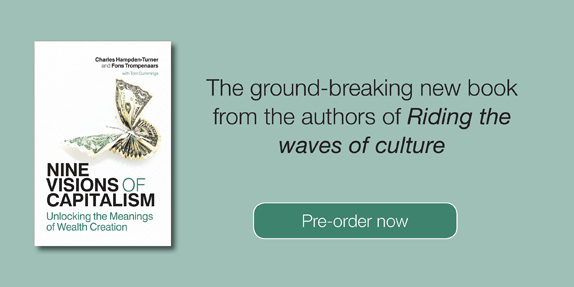Watching the inexorable and tragic dismemberment of Greece
6 July 2015 by Catherine Holdsworth in Business and finance, Current events, Nine visions of capitalism
By Charles Hampden-Turner, co-author of Nine visions of capitalism.
In comedy, opposed values bounce off each other harmlessly and humorously and we laugh at human frailty. In tragedy, opposed values grind painfully against each other in a strife that destroys all that lies between them. In Greece today the comic festivals are over and we are watching tragedy in real time, from which there may be no way out. Europe’s cultural wars are rooted in religion; despite the fact that piety and worship are diminishing, religion has shaped us for centuries and left its mark. To the North and West are the Protestants, rule-bound, individualist, neutral, analytical, abstract, impassive and self-controlled. To the South and East are the Catholics and Greek Orthodox, exceptional, communal, passionate, holistic, earthy and self-indulgent. Economically, Britain, Germany, Switzerland, the Netherlands, Scandinavia, Finland and North America are doing better than Italy, Spain, Greece, Portugal and France and even the latter owes much of its wealth to Huguenots, its Protestant minority. Partial exceptions are Austria and Belgium.
If we add to this mix, then the cultural revolution of the late sixties and early seventies demonstrated that much of the Western world tipped over from a culture of production to one of consumption; life was to be enjoyed! However, the postponement of gratification began to erode. The Catholic and Greek Orthodox countries had always been ‘indulgent’; started by the sale of indulgences well before the Catholic Reformation. The religious services of Catholics and the Greek Orthodox Church have always been spectacular, full of mysterious exceptions, decorative, colourful and rich. In contrast, those of the Protestants have been full of rules: restrained, plain-spoken, sparse, subdued and frugal. The arrival of the consumer culture only exaggerated the luxurious strain in southern religions.

Two popular films of the time celebrated this difference and took the Greek side. Zorba the Greek, from the novel by Nikos Kazantzaki featured Basil, a Greek writer, educated in Britain whose intellect had strangled his emotions. He was re-visiting his lost origins. He meets Zorba, earthy, lascivious and passionate who teaches Basil how to dance with joy. Only Zorba weeps for Stella, a free-spirited widow who sleeps around and is decapitated by angry villagers when her locally popular footballing lover kills himself. Basil, who also slept with her, turns her death into a lofty abstraction. Zorba is the Vitalist, the hero of the counter-culture, who lives life to the full and celebrates the sensations of the here and now.
The second film was Never on Sunday, also a celebration sexuality and joy, in which Homer, an overly serious and solemn American academic and tourist encounters Ilya, a Greek prostitute, who enjoys her sailor-clients, but ‘never on Sunday’, clinging to her last vestiges of piety. Homer, in love with classical Greece but ignorant of modern Greek mores, tries to reform Ilya, but is instead seduced by her joyous lifestyle. Taken by him to tragic plays she insists that all protagonists therein ‘went down to sea-shore’ and had a party and will not hear Homer’s denials. The plot of Pygmalion is turned upside down with the pupil subverting her trainer who in the end wants only to make love to her.
But all ceremonies of joy come to an end and what we face in Greece today harks back to classic tragedy in which Dionysus has drunk and feasted too much for too long while the bean-counters of the European Union sternly disapprove. Greece has failed to collect its own taxes, failed to cut an ever-mounting deficit, distributed pensions it cannot afford and is in debt to the tune of $50 billion and may take forty years of iron discipline to dig itself out of the hole, a virtue it does not possess! On the one hand is the austerity proclaimed by the Protestant Northwest and insisted upon by creditors who could lose everything. On the other hand is the refusal of a culture of vibrancy and celebration to be reduced to rags and penury. As Lord Byron put it, ‘eternal summer gilds them yet’ and Greece is the land of vacations and aesthetic sensibilities. Ironically both sides are correct. Greece is a victim of its own long refusal to face economic realities. To that extent Germany and the European Commission are correct. However, austerity has clearly worsened not improved Greece’s plight and it’s hard to think of a policy that goes so much against the cultural grain of its people: they are suffering misery and this will only impoverish them further.
It is classic Greek tragedy: the clash of noble yet opposite ideals leading to catastrophe, literally ‘the downturn in the fortunes of the hero’. We crucify ourselves upon a cross of half-truths. The answer is to find joy and meaning in the work we must do, but Greece is a long, long way from that goal. Catharsis was the collective shudder that ran through the audience in the amphitheatre, sitting shoulder-to-shoulder and feeling the agony of the whole audience. Alas, catharsis is upon us all. The shuddering may have just begun. The devalued drachma may be the only stop-gap measure before a whole nation re-defines the purpose of life, as it must.
To find out more about Charles Hampden-Turner and Fons Tromenaars, and their company, please click here.

